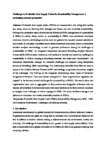Challenges in perishable food supply chains for sustainability management: A developing economy perspective
| dc.contributor.author | Kumar, A | |
| dc.contributor.author | KUMAR MANGLA, SACHIN | |
| dc.contributor.author | Kumar, P | |
| dc.contributor.author | Karamperidis, Stavros | |
| dc.date.accessioned | 2021-09-07T12:26:01Z | |
| dc.date.issued | 2020-07 | |
| dc.identifier.issn | 0964-4733 | |
| dc.identifier.issn | 1099-0836 | |
| dc.identifier.uri | http://hdl.handle.net/10026.1/17767 | |
| dc.description.abstract |
<jats:title>Abstract</jats:title><jats:p>Perishable food supply chains (PFSCs) are characterized with rising food quality and safety concerns, alarming food wastages and losses, and poor economic sustainability. Because of the perishable nature of products and limited shelf life, management of sustainability in PFSCs is critical. Many studies on sustainability in PFSCs have considered developed countries; however, developing countries have not gathered the required research attention in this domain. In this paper, a decision theory‐based framework is adopted, where a prescriptive decision analysis methodology is used to generate preferences among the challenges to sustainability in PFSC. An integrated interpretive structural modelling–analytic network process (ISM–ANP) decision framework is formulated to identify and model key challenges to sustainability in PFSCs, keeping a developing economy like India under consideration. The contextual relationships amongst the extracted challenges are analyzed using the ISM methodology. The relationships identified from ISM are used as inputs in the ANP methodology, to generate the priority weights of the challenges. The findings of the integrated methodology show that “lack of horizontal integration of farmers,” “poor pre‐harvest management,” and “lack of government regulation and support” are the most critical challenges for sustainability in PFSCs. The results show that organizations must work on aggregation of farm produce and integration of farmers with the market. Development of infrastructures and cold chain facilities at the farm level is necessary to mitigate these challenges to reduce wastages in PFSC. The study facilitates managers and planners to understand and enable sustainable practices in PFSCs.</jats:p> | |
| dc.format.extent | 1809-1831 | |
| dc.language | en | |
| dc.language.iso | en | |
| dc.publisher | Wiley | |
| dc.subject | challenges | |
| dc.subject | developing economy | |
| dc.subject | environmental performance | |
| dc.subject | ISM-ANP | |
| dc.subject | perishable food supply chain (PFSC) | |
| dc.subject | sustainability management | |
| dc.title | Challenges in perishable food supply chains for sustainability management: A developing economy perspective | |
| dc.type | journal-article | |
| dc.type | Journal Article | |
| plymouth.author-url | https://www.webofscience.com/api/gateway?GWVersion=2&SrcApp=PARTNER_APP&SrcAuth=LinksAMR&KeyUT=WOS:000509830600001&DestLinkType=FullRecord&DestApp=ALL_WOS&UsrCustomerID=11bb513d99f797142bcfeffcc58ea008 | |
| plymouth.issue | 5 | |
| plymouth.volume | 29 | |
| plymouth.publication-status | Published | |
| plymouth.journal | Business Strategy and the Environment | |
| dc.identifier.doi | 10.1002/bse.2470 | |
| plymouth.organisational-group | /Plymouth | |
| plymouth.organisational-group | /Plymouth/Faculty of Arts, Humanities and Business | |
| plymouth.organisational-group | /Plymouth/Faculty of Arts, Humanities and Business/Plymouth Business School | |
| plymouth.organisational-group | /Plymouth/REF 2021 Researchers by UoA | |
| plymouth.organisational-group | /Plymouth/REF 2021 Researchers by UoA/UoA17 Business and Management Studies | |
| plymouth.organisational-group | /Plymouth/Users by role | |
| plymouth.organisational-group | /Plymouth/Users by role/Academics | |
| dcterms.dateAccepted | 2020-01-10 | |
| dc.rights.embargodate | 2022-1-29 | |
| dc.identifier.eissn | 1099-0836 | |
| dc.rights.embargoperiod | Not known | |
| rioxxterms.versionofrecord | 10.1002/bse.2470 | |
| rioxxterms.licenseref.uri | http://www.rioxx.net/licenses/all-rights-reserved | |
| rioxxterms.licenseref.startdate | 2020-07 | |
| rioxxterms.type | Journal Article/Review |


